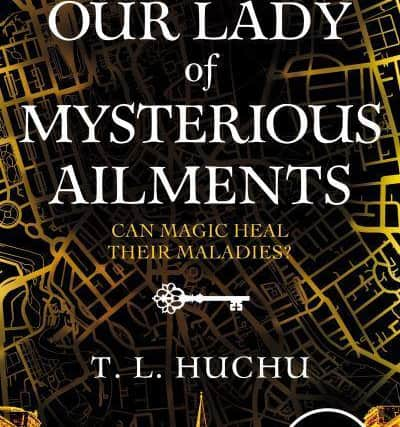Book review: Our Lady Of Mysterious Ailments, by TL Huchu


I really rather enjoyed the first instalment of TL Huchu’s “Edinburgh Nights” series, The Library Of The Dead. It was smart, clever and set up the series well, although I have a slight aversion to “we’ve defeated the villain but have learned that there’s a worser and worst villain to come” form of fantasy storytelling. (CS Lewis or Susan Cooper never played that slightly cheap trick). But I was predisposed to enjoy the new volume. Unfortunately, I felt cheated. Our Lady Of Mysterious Ailments feels to me, to use a TV term, a “filler episode”. There are portentous hints about awful things to come – who is The Tall Man or the One Above All, and what will be the heroine’s role in all this? – but they are never revealed here. It has its moments, assuredly, but it feels like an author treading water. Nothing, by the end of the book, has really changed.
The premise is a reprise of the previous novel. An adolescent is ill, and it may be that preternatural forces are behind it. Priyanka, the wheelchair using magician from the first book, reaches out to her friend Ropa, for help on the case. Ropa is from the wrong side of the tracks in this dystopian Scotland, but a secretive and arcane elite has taken her under their wing. She has even been given an internship with the occult group, and is royally annoyed that internships don’t pay and that even sorcerers have to deal with office politics. Compared to the first book, the snark of Ropa has been dialled up: “the minger smirks and gives me the finger”, “arsewipe”, “wee shithole”. There is a form of confidence in sprinkling references of William of Ockham next to more colourful language, although some of the aints and dunnos and gonnas and muppets seem as if the book was intended as an American graphic comic-book and grafted onto a Scottish setting.
Advertisement
Hide AdI certainly plays on Scottish references, from James VI’s Daemonolgie to Aleister Crowley to the Darien Adventure and the foundation of the Royal Bank of Scotland (and its subsequent travails). Too often these are info-dumps of a “did you know?” variety. Various plot lines are vying for attention: the sick teenager, a heist involving monies from the Act of Settlement, an astral voyager of dubious repute, a mysterious group called the Monks of the Misty Order and a final confrontation with a 17th century figure (I can’t under due diligence name the individual in question as they will be recognised by anyone who has read Stevenson, or for that matter, the Evening News reporting on desecrations). You can add into that a degree of political posturing. “If Scotland set up a free-trade zone there” – referring to Panama – “they could kick back and watch the dosh roll in while everyone else did the heavy lifting. It was a smart plan but colonization ain’t cheap… money flowed in fair enough, but soon as things started looking real, the auld enemy set about cockblocking… they’d raised a hefty sum equivalent to one-fifth of the nation’s wealth – a big middle finger to the wankers south of the border”. This is more Horrible Histories than taking history seriously.


There are two stand out set-pieces, one involving some aggressive topiary and one where a human is flayed into a book, but these are not enough to save the novel from a desultory feel. I genuinely hope the next book – which I will read – has more ambition.
At the same time, I read another second book in a series. CK McDonnell’s This Charming Man is again set within the dysfunctional newspaper “The Stranger Times”. Anyone of at least my middle age will get the reference in the title, and McDonnell makes Manchester chaotic, hilarious, elegiac and sinister at the same time. This time, there are reports of young men with sharp teeth who can’t abide sunlight. When the team reaches out to their supernatural contacts, they are told it simply is not true, as vampires have never been real and were just a human made-up story. McDonnell manages to be very, very funny and still put across a serious point. In this, it is about men who are predatory and “incels”, needy and vainglorious at the same time. The work has already been compared frequently to Terry Pratchett, and given the whip-crack sharp lines and wryness, it is not inappropriate. But it is not a weak clone of Pratchett’s work, and it has its own political edge. It, like Huchu’s novel, also is setting up its own future, but while Huchu just hints at a future Big Bad, McDonnell ends with a remarkably touching insight into one character’s secret grief.
My colleague (and mentor) Allan Massie has said of fantasy that if anything is possible, nothing is consequential. That is why Marvel Comics had a rule that magic must be balanced by repercussion. These books reflect that dynamic in different ways. If I were to interview Huchu, I would ask “Which of your characters are you prepared to kill?” If I were to interview McDonnell, I would ask “Which classic monster are you revamping next?”
Our Lady Of Mysterious Ailments, by TL Huchu, Tor, £16.99
A message from the Editor:
Thank you for reading this article. We're more reliant on your support than ever as the shift in consumer habits brought about by coronavirus impacts our advertisers.
If you haven't already, please consider supporting our trusted, fact-checked journalism by taking out a digital subscription at https://www.scotsman.com/subscriptions